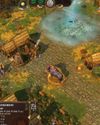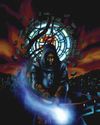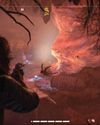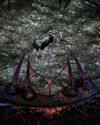
For some, the post-TNG era of Star Trek feels overused. There were several excellent films (no questions, please) and new iterations of Star Trek set in the years following the end of Captain Picard’s story – including an eponymous show of his own. There are also at least a dozen games set in the TNG and post-TNG universe, including the massively successful Star Trek Online, but none of them really captured the true spirit of Starfleet.
It seems fitting, then, that as the cinematic universe closes on the story of Picard and the rest of the Enterprise D’s crew, a new game carrying on the lore from my favourite era emerges. Launching in May, Star Trek: Resurgence is set in 2380, right after the events of Star Trek: Nemesis and roughly 16 years after Picard, Riker and co set out on their continuing mission to explore strange new worlds.
The team at Dramatic Labs – a small group of around 30 mostly ex-Telltale employees who are self-confessed Trekkies – had a vision for a Star Trek game long before Resurgence was in development. The Telltale formula of a strong narrative combined with morally grey decision-making and plenty of QTEs seemed to fit the Star Trek storytelling style perfectly – Star Trek is, after all, historically a series weaving a complicated narrative about the wider universe.
But Dramatic Labs offers something more: intricate puzzles, stealth sequences, better cinematics, and an overall departure from the Telltale default of feeling like you’re watching an interactive movie. Resurgence deviates further from the Telltale norm by not being episodic, rather each swap between player characters is a uniquely titled episode. As writer Andrew Grant summarised, “We wanted more game in our videogames.” It’s Star Trek, but not as we know it.
This story is from the {{IssueName}} edition of {{MagazineName}}.
Start your 7-day Magzter GOLD free trial to access thousands of curated premium stories, and 9,000+ magazines and newspapers.
Already a subscriber ? Sign In
This story is from the {{IssueName}} edition of {{MagazineName}}.
Start your 7-day Magzter GOLD free trial to access thousands of curated premium stories, and 9,000+ magazines and newspapers.
Already a subscriber? Sign In

A New Dawn - The rise, fall and rise again of PC Gaming in Japan
The so-called 'Paso Kon' market (ie katakana's transliteration of 'Pasonaru Computa') in Japan was originally spearheaded in the 1980s by NEC's PC-8800 and, later, its PC-9800.

MARVEL: ULTIMATE ALLIANCE
Enter the multiverse of modness.

SLIDES RULE
Redeeming a hated puzzle mechanic with SLIDER

GODS AND MONSTERS
AGE OF MYTHOLOGY: RETOLD modernises a classic RTS with care

PHANTOM BLADE ZERO
Less Sekiro, more Wo Long: Fallen Dynasty

STARR-MAKING ROLE
Final Fantasy XVI's BEN STARR talks becoming a meme and dating summons

THIEF GOLD
Learning to forgive myself for knocking out every single guard.

HANDHELD GAMING PCs
In lieu of more powerful processors, handhelds are getting weirder

FAR FAR AWAY
STAR WARS OUTLAWS succeeds at the little things, but not much else shines

FINDING IMMORTALITY
Twenty-five years on, PLANESCAPE: TORMENT is still one of the most talked-about RPGs of all time. This is the story of how it was created as a ‘stay-busy’ project by a small team at Black Isle Studios